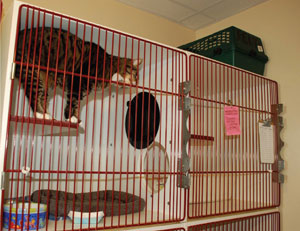Doubling space for cats in shelters reduces upper respiratory disease
Upper respiratory infection in cats in shelters can be dramatically decreased by doubling cage sizes and providing cats with two compartments, reported Morris Animal Foundation–funded researchers at the University of California-Davis.

Upper respiratory infection decreases the likelihood of a cat being successfully adopted and is a leading cause of illness and euthanasia in cats in shelters. The UC-Davis team published its findings Jan. 2 in PLoS One, a multidisciplinary online journal of the Public Library of Science. The study is available at https://jav.ma/catspace.
Upper respiratory infections in cats commonly are caused by feline herpesvirus type 1 and often emerge during times of stress. A substantial number of cats develop URIs within their first two weeks of coming to a shelter. Many shelters invest as much as a third of their resources in cat care dealing with this one disease.
To better understand and combat the problem, the UC-Davis team worked with nine animal shelters across North America. Shelter staff members recorded data daily about the feline populations, such as how many cats had a URI and how long those cats had been at the shelter. Staff members also filled out surveys that included questions about cage size, hide boxes, disinfection practices, and vaccinations.
The UC-Davis team found that, to minimize stress and cases of URI, cats needed about 8 square feet of floor space inside cages, rather than the common average of 4 square feet. Cats also were less likely to get sick at shelters with double-compartment cages that allowed each cat to remain comfortably on one side of the cage while the other side was cleaned. This configuration furthermore allowed separation of the litter box from food, water, and the bed, which may have further lowered stress.
Dr. Kate Hurley, director of the UC-Davis Koret Shelter Medicine Program, and colleagues already have begun to assist interested shelters in remodeling existing cages.
Related JAVMA content:
Morris funds research on upper respiratory tract infection in shelter cats (Jan. 15, 2010)